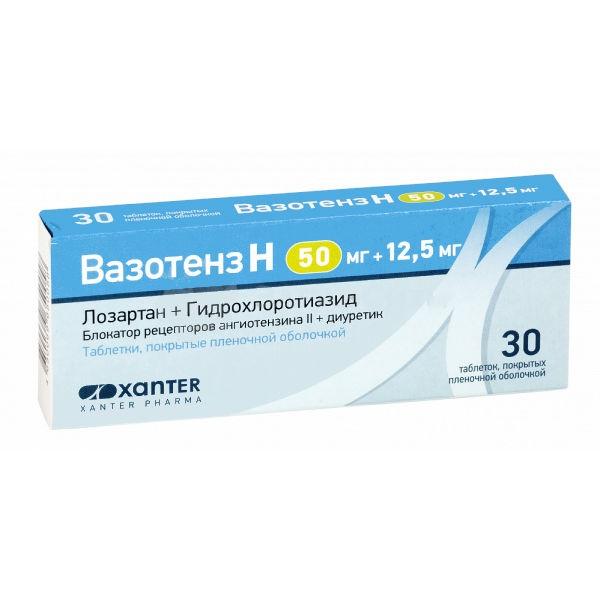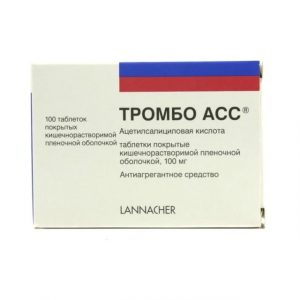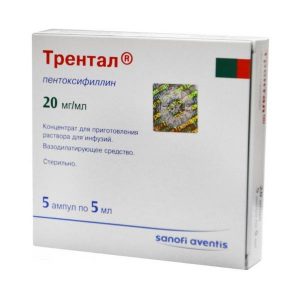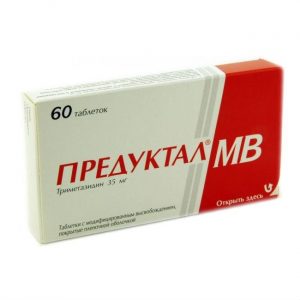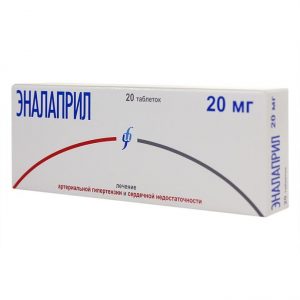Description
Release form
Tablets
Pharmacological action
Vazotens N – a combined drug, has a hypotensive effect. Contains potassium losartan, an angiotensin II receptor antagonist (subtype AT1), and hydrochlorothiazide, a diuretic.
– Losartan is a specific antagonist of angiotensin II receptors (subtype AT1). Does not inhibit kinase II – an enzyme that destroys bradykinin. Reduces total peripheral resistance (OPSS), the concentration of adrenaline and aldosterone in the blood, blood pressure (BP), pressure in the pulmonary circulation reduces afterload, has a diuretic effect. It interferes with the development of myocardial hypertrophy, increases exercise tolerance in patients with chronic heart failure.
– Hydrochlorothiazide – a thiazide diuretic. Reduces the reabsorption of sodium ions, enhances the excretion of potassium, bicarbonate and phosphate ions in the urine. It lowers blood pressure by reducing the volume of circulating blood (BCC), changing the reactivity of the vascular wall, reducing the pressor effect of vasoconstrictors and enhancing the depressant effect on the ganglia.
Indications
– arterial hypertension (in patients for whom combination therapy is optimal).
contraindications – hypersensitivity to the components of the drug Vazotens N, hypersensitivity to other
sulfonamide derivative – anuria
– severe arterial hypotension
– severe hepatic dysfunction
– severe renal impairment (KK 30 ml / min.)
– hypovolemia (incl. against the background of high doses of diuretics)
– pregnancy and lactation
– age up to 18 years (efficacy and safety have not been established).
Caution: for patients with bilateral renal artery stenosis or stenosis of a single kidney artery, with impaired water-electrolyte blood balance (dehydration, hyponatremia, hypochloremic alkalosis, hypomagnesemia, hypokalemia).
With caution, the drug is used in patients with diabetes mellitus, hypercalcemia, hyperuricemia and / or gout, as well as in patients with an allergic history and bronchial asthma, as well as systemic diseases of the connective tissue (including systemic lupus erythematosus), with concomitant use with NSAIDs including COX-2 inhibitors).
Use during pregnancy and lactation
Vasotens N is contraindicated in pregnancy and lactation.
Taking medications directly acting on the renin / angiotensin system during the second and third trimesters of pregnancy can lead to fetal death. In the event of pregnancy, the withdrawal of the drug Vazotens N.
is indicated. Pregnant women are usually not recommended to use diuretics due to the risk of jaundice in the fetus and newborn, and mother’s thrombocytopenia. Diuretic therapy does not prevent the development of toxicosis of pregnancy.
Special instructions
May be prescribed with other antihypertensives.
There is no need for special selection of the initial dose for elderly patients.
The drug Vazotens N can increase the concentration of urea and creatinine in blood plasma in patients with bilateral renal artery stenosis or stenosis of a single kidney artery.
Hydrochlorothiazide may increase arterial hypotension and disturbances in the water-electrolyte balance (decrease in circulating blood volume, hyponatremia, hypochloremic alkalosis, hypomagnesemia, hypokalemia), impair glucose tolerance, reduce calcium excretion in urine and cause a transient, slight increase in blood plasma concentration, a slight increase in blood concentration increase the concentration of cholesterol and triglycerides, provoke the occurrence of hyperuricemia and / or gout.
Influence on the ability to drive vehicles and control mechanisms
There is no information on the impact on the ability to drive a car and other mechanisms.
Composition
1 tablet contains:
Active substances: losartan potassium 50 mg hydrochlorothiazide 12.5 mg.
Excipients: mannitol, microcrystalline cellulose, croscarmellose sodium, povidone, magnesium stearate, Opadry white (hypromellose 3cP, hydroxypropyl cellulose, titanium dioxide, macrogol, hypromellose 50cP).
Dosage and administration
Inside, int Depending on the meal.
The usual starting and maintenance dose of Vasotens N is 50 mg of losartan / 12.5 mg of hydrochlorothiazide (1 tablet) per day. For those patients who cannot achieve adequate blood pressure control at this dosage, the dose can be increased to 2 tablets (50 mg / 12.5 mg) or 1 tablet (100 mg / 25 mg) 1 time / day. The maximum dose is 2 tablets (50 mg / 12.5 mg) or 1 tablet (100 mg / 25 mg) 1 time / day.
In general, the maximum hypotensive effect is achieved within 3 weeks after the start of treatment.
There is no need for special selection of the initial dose for elderly patients.
Side effects
Side effects are limited to those previously observed with losartan potassium and / or hydrochlorothiazide.
The most common side effects in the treatment of essential hypertension are dizziness.
Allergic reactions: anaphylactoid reactions, angioedema, including swelling of the larynx and / or tongue, leading to obstruction of the airways, and / or swelling of the face, lips, pharynx, and / or tongue, occasionally noted with losartan. Some of these patients previously experienced angioedema with other drugs, including ACE inhibitors. It is extremely rare when taking losartan that vasculitis was noted, including Shenlein-Genoch disease.
From the cardiovascular system: lowering blood pressure.
From the digestive tract: when taking losartan, rare (1%) cases of hepatitis, diarrhea were reported.
On the part of the respiratory system: when taking losartan – cough.
From the skin: urticaria.
On the part of laboratory parameters: rarely (1%) – hyperkalemia (serum potassium more than 5.5 mmol / l), increased activity of liver enzymes.
Drug interaction
losartan enhances the effect of other antihypertensive drugs. No clinically significant interaction with hydrochlorothiazide, digoxin, indirect anticoagulants, cimetidine, phenobarbital, ketoconazole, erythromycin was noted. Rifampicin and fluconazole have been reported to lower the level of active metabolite. The clinical significance of these interactions has not been studied.
Like other drugs that block angiotensin II or its effect, the simultaneous administration of potassium-sparing diuretics (for example, spironolactone, triamteren, amiloride), potassium preparations, or salt substitutes containing potassium can lead to hyperkalemia.
NSAIDs, including selective cyclooxygenase-2 inhibitors can reduce the effect of diuretics and other antihypertensive agents.
In some patients with impaired renal function who have been treated with NSAIDs (including COX-2 inhibitors), treatment with angiotensin II receptor antagonists can cause further impairment of renal function, including acute renal failure, which is usually reversible.
The antihypertensive effect of losartan, like other antihypertensive agents, may be weakened when taking indomethacin.
Hydrochlorothiazide
The following drugs can interact with thiazide diuretics while taking them: Barbiturates, drugs, ethanol – orthostatic hypotension may potentiate.
Hypoglycemic agents (oral agents and insulin) – dose adjustment of hypoglycemic agents may be required.
Other antihypertensives – possible additive effect.
Colestyramine and colestipol reduces the absorption of hydrochlorothiazide.
GCS, ACTH – increased electrolyte loss, especially potassium.
Pressor amines – a slight decrease in the effect of pressor amines is possible, not hindering their use.
Non-depolarizing muscle relaxants (for example, tubocurarine chloride) – an increase in the effect of muscle relaxants is possible.
Lithium preparations – diuretics reduce the renal clearance of lithium and increase the risk of lithium intoxication, so simultaneous use is not recommended.
NSAIDs, including selective COX-2 inhibitors: can reduce the diuretic, natriuretic and antihypertensive effect of diuretics.
Impact on laboratory test results
Due to its effect on calcium excretion, thiazides can influence the results of parathyroid function analysis.
Overdose
Symptoms caused by losartan overdose: marked decrease in blood pressure, tachycardia, bradycardia (as a result of vagal stimulation).
Symptoms caused by an overdose of hydrochlorothiazide: loss of electrolytes (hypokalemia, hyperchloremia, hyponatremia), as well as dehydration resulting from excess diuresis.
Treatment: symptomatic and supportive therapy. If the drug Vasotens H is recently taken, it is necessary to wash the stomach, if necessary, correct water-electrolyte disorders.
Losartan and its active metabolites are not removed by hemodialysis.
Deystvuyuschee substances
Hydrohlorotyazyd, Losartan
pharmacy terms and conditions
prescription
orma
tablet
Appointment
Adult prescription
Indications
Prevention of heart attacks and strokes, Hypertension
Possible product names
Vazotens N tablets coated. 50 mg + 12.5 mg 30 pcs.
Actavis AD, Switzerland
